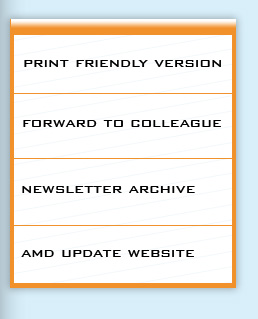 |
|
June 2013, Issue 58
Emerging Practice Patterns with Aflibercept for the Treatment of Exudative Age-Related Macular Degeneration
 |
James A. Eadie, MD |
 |
Barbara A. Blodi, MD |
 |
Michael S. Ip, MD |
With the FDA approval of aflibercept in September of 2012, ophthalmologists gained an additional option for the treatment of exudative age-related macular degeneration (AMD). The results of the VIEW 1 and VIEW 2 trials were recently summarized in the December 2012 issue of Ophthalmology.1 Both of these trials demonstrated the non-inferiority of aflibercept, dosed every two months after three monthly loading doses, when compared with ranibizumab dosed monthly. These findings have the potential to impact clinical practice. The use of aflibercept, as described in the VIEW trials, may reduce the number of office visits and injections in our patients with AMD. This could reduce the treatment burden on patients and their families, and reduce the chance of injection-related complications.
Despite the data from VIEW 1 and VIEW 2, it is our impression that, at present, ophthalmologists have been slow to adopt aflibercept as their primary modality for treating exudative AMD. The 2012 American Society of Retinal Specialists (ASRS) Preferences and Trends (PAT) survey pooled responses from 631 retina providers. The survey showed that 22.6% of responders in the United States and Canada had not used aflibercept at all in the treatment of exudative AMD. Only 10.8% of these practitioners reported that it was their management of choice for patients with subfoveal choroidal neovascularization secondary to AMD. Additionally, only 3.6% use aflibercept for all new patients and 2.1% are actively converting all of their patients to this medication. In contrast, 63.6% of responders in the United States and Canada use aflibercept for selected patients, with 80% responding that they would recommend a switch to aflibercept in patients with some combination of persistent subretinal fluid, pigment epithelial detachment or retinal cysts despite multiple injections of ranibizumab or bevacizumab. Interestingly, when asked if there were no difference in cost between the three medications, the same group of practitioners responded that 12.6% would use bevacizumab, 30.4% ranibizumab, and 55.7% aflibercept as their treatment of choice for new onset exudative AMD.2
The responses to the 2012 ASRS PAT survey suggest that aflibercept is currently not being widely used as the initial treatment of choice for exudative AMD. Instead, aflibercept is predominantly being used as a rescue therapy for those patients who have a suboptimal response to initial treatment with bevacizumab or ranibizumab. The reasons for this are likely multifactorial and may involve a combination of medication cost (bevacizumab is significantly less expensive than ranibizumab and aflibercept), physician experience (bevacizumab and ranibizumab have been available since 2005 and 2006, respectively), and physician and patient satisfaction with the outcomes that have been obtained with the use of bevacizumab and ranibizumab for AMD. It will be of interest to revisit this topic in the near future to see if our collective practice patterns evolve as we gain more experience with the use of aflibercept.
References:
1. Heier JS, Brown DM, Chong V, et al. Intravitreal Aflibercept (VEGF Trap-Eye) in Wet Age-related Macular Degeneration. Ophthalmology. Dec 2012 119(12); 2537-2548
2. ASRS PAT Survey 2012. http://www.asrs.org/asrs-community/pat-survey
|
|

Ingrid U. Scott,
MD, MPH, Editor

Professor of Ophthalmology and
Public Health Sciences,
Penn State College of Medicine
|

|
| |
|








